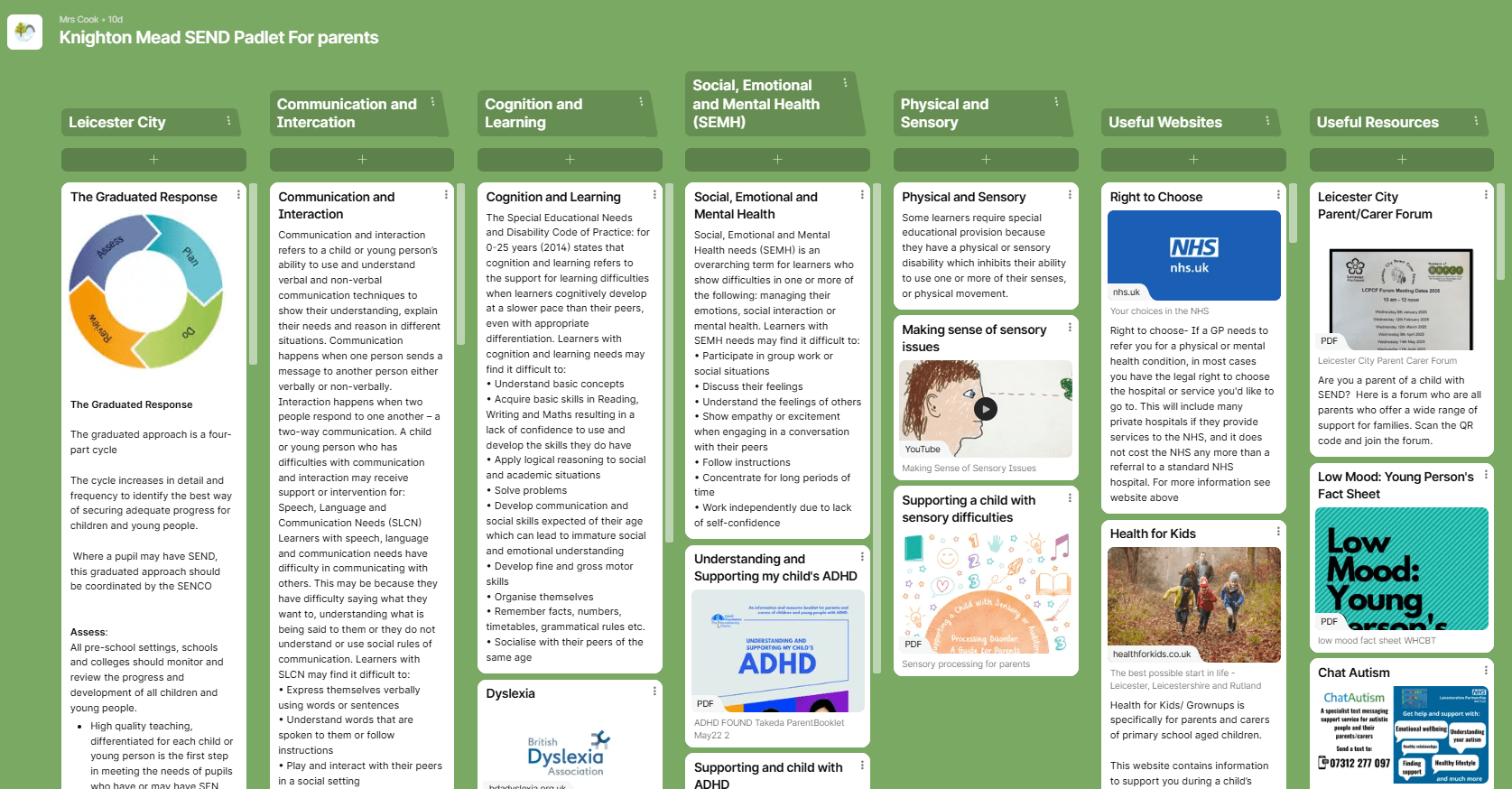| What is the Age Range of pupils at Knighton Mead |
3 to 11 | |
| Special Educational Needs Coordinator (SENDCo) | Ms D Cook | |
| Academy Councillor with responsibility for SEND | Mr Milan Premdjy | |
| Contact Information | Email (admin) | [email protected] |
| Local Offer Webpage Link | Special educational needs and disabilities (SEND) (leicester.gov.uk) | |
Knighton Mead SEND Padlet For parents
Click on the image below to open Padlet link:
SEND Information Report
Special Educational Needs and Disabilities (SEND) at Knighton Mead Primary Academy
At Knighton Mead Primary School, we understand that every child is unique, and we are committed to helping all our pupils thrive. The main area of Special Educational Needs (SEN) we support at our school is Speech, Language and Communication. We know how important these skills are for learning, building friendships, and developing confidence.
We believe that working in partnership with parents and carers is key. We will always involve you in planning your child’s support and keep you updated on their progress. If you ever have questions or concerns, we’re here to listen and work together to help your child succeed.
We value every child and aim to provide an inclusive education where all students can succeed. We offer a broad curriculum and high expectations, supporting children based on their unique needs.
What is SEND?
- According to the 2014 Code of Practice, a child has SEND if they require support beyond what is typically available to their peers. The four main areas of need are:
- Communication & Interaction – e.g., speech delays, autism
- Cognition & Learning – e.g., dyslexia, global learning difficulties
- Social, Emotional & Mental Health – e.g., anxiety, ADHD
- Sensory & Physical Needs – e.g., visual/hearing impairments, dyspraxia
| Type of SEND | Provision In Place |
|---|---|
| Communication and Interaction (e.g. speech articulation, stammering, speech and language delay, autism etc) | -Fun Time (Early Years small group intervention to develop social, communication and interaction skills)
-Play Interaction (1:1 / small group intervention for children who struggle with their peers) -1:1 speech and language support with TA -Small language group with TA -Communication and Interaction programme specified by ASD team -Strategies taught to manage stammer as recommended by external Speech and Language Therapist -Individual visual timetable -Visual aids to help learning -Task Plans -Voice 21 strategies |
| Cognition and Learning (e.g. global learning difficulties, dyslexia, dyscalculia etc) | -BRP (1:1 Reading intervention)
-Recommendations from external agencies (Learning, Communication and Interaction / Speech and Language Therapy, Hearing Impairment Team, Visual Impairment Team and Educational Psychologist) -Writing task lists / task plans -Writing frames -Coloured overlays / paper as recommended by Specialist Optometrist -Phonic interventions (1:1 and small groups to help develop phonic , spelling and reading skills) -Talk boxes to help children with memory difficulties -Spelling Tutor to support children with spelling difficulties -Inference to support children with their comprehension skills -TA support within year groups |
| Social, Emotional and Mental Health Difficulties (e.g. anxiety, depression, eating disorders, obsessive, compulsive disorder (OCD) etc) | -1:1 Emotional check ins with our Pastoral Lead
-Sibling Group (to develop positive relationships and social skills with siblings) -Play Therapy via external Specialist -Support from the LA Social, Emotional, Mental, Health Team – Breakfast Club -The RB2L team support parents/carers in school -Advice from School Nurse / other health professional will be implemented -Fidget aids -children are given resources to help maintain and develop attention and concentration -Learning breaks and movement breaks -Trust support from the Inclusion Director and Primary Intervention Lead |
| Sensory and Physical Needs (Visual impairment, hearing impairment, sensory needs (e.g. autism, dyspraxia, toileting issues, physical disability etc) | -Sensory resources
-Sensory breaks for children with Autism who require them – Pencil grips -Adapted cutlery as recommended by Occupational Therapists -Advice from School Nurse / other agencies will be implemented -Trained staff for specific physical/medical needs –Fine motor skills intervention -All resources/ strategies recommended by external agencies/ Health will be implemented -Worksheets will be printed in recommended font for children with a visual impairment -Regular support from HI team for children with Hearing Impairment -Regular support from the VI team for children with Visual Impairment -Disabled toilet and changing facilities -Use of ICT- iPad to support board share and laptops |
Where can I find the schools Accessibility Policy?
The Accessibility Policy can be found on this website under “Policies” on the “Our Academy” page.
What are the admission arrangements for pupils with SEND at Knighton Mead?
- Admissions are handled via Leicester City Council (School admissions). Children with SEND receive additional transition support as needed.
What are the arrangements for supporting pupils with SEN who are looked after by the local authority?
- Children who are looked after by the local authority (LAC) and have special educational needs (SEN) receive a Pupil Outcome Passport and a Personal Education Plan (PEP), which are reviewed every term and at six-monthly Looked After Children’s Reviews. They are treated fairly like all other pupils. If they have complex needs, a Learning Mentor from the Virtual School may be assigned. Pupil Premium Plus funding is used to provide additional support.
What training do staff have to support pupils with SEN?
- All teachers are trained to support children with SEN. This is kept up to date regularly and all can access advice, resources, and training.
- Training is available through in-house or local authority courses, books, and websites.
- Some teaching assistants (TAs) have specialist training in specific interventions.
- The school can access additional expertise from the local authority, including Educational Psychologists and Advisory Teachers if needed.
What facilities help pupils access the academy?
- The academy follows an accessibility plan under the Equality Act 2010.
- The plan focuses on improving education, the physical environment, and information access.
- Details are available on the school website.
What equipment and facilities support pupils with SEND?
- Resources and interventions are funded through the SEND budget.
- If a child needs extra adult support, the SENCo can apply for Element 3 funding from the local authority.
- All pupils with SEND have a Pupil Outcome Passport outlining their support.
What support services are available?
If your child needs help from external agencies, we will make a referral with parental consent.
We work with:
- Early Years Support Team
- Learning, Communication & Interaction Support Team
- Primary School Social, Emotional & Mental Health Team
- Educational Psychology Service
- Hearing & Vision Support Teams
- Speech & Language Therapy Service
- School Nurse & Health Professionals
- Family Support Officers
- Trust’s Inclusion Director
- Early Help
More details and a link to the local offer are on our website.
How does Knighton Mead adapt the curriculum and learning environment for pupils with SEND?
- For pupils with SEND, teachers further adapt the curriculum and environment to remove barriers to learning.
- Adaptations may include strategies from the SENCo or external specialists.
- Specialised equipment, ICT, or extra adult support may be provided if needed.
- All actions are recorded and shared with parents.
How does Knighton Mead ensure pupils with SEND can join in all activities?
- Reasonable adjustments are made so all children can participate.
- Staff are trained to ensure no child with SEND is excluded.
What steps are taken to prevent pupils with SEND from being treated unfairly?
- The Everyone’s Welcome approach celebrates diversity using age-appropriate books.
- High-quality teaching is adapted to meet all learners’ needs.
- Children with disabilities receive reasonable adjustments to improve access.
- The quality of SEND teaching is monitored through:
- Classroom observations
- Progress assessments
- Work reviews
- Teacher-SENCo meetings
- Pupil and parent feedback
- Attendance and behaviour tracking
How does Knighton Mead evaluate the effectiveness of SEN support?
- Pupils’ progress is tracked, and those falling behind are discussed in termly meetings.
- If extra support is needed, parents are informed, and interventions are planned.
- SEN support follows the Graduated Approach:
- Assess: Review data and discuss needs with parents.
- Plan: Agree on additional support and interventions.
- Do: Record SEN support in a Pupil Outcome Passport with clear outcomes.
- Review: Track and discuss progress with parents each term.
- If progress is not made, external specialists may be involved, such as:
-
- SEN Support Services
- Learning & Communication Teams
- Educational Psychology Services
- School Nurse, Social Services, CAMHS, and more
- If a child’s needs are very complex, the school may request an Education, Health & Care (EHC) Plan from the local authority.
How does Knighton Mead assess and review pupil progress?
- Every child’s progress is closely tracked by teachers and leadership.
- The SENCo helps identify the best strategies for support.
- External specialists may assess and contribute to progress tracking.
- Parents receive termly updates via reviews, reports, and Parents’ Evenings.
- A home-school diary may be used for regular communication.
- Parents can arrange meetings with teachers, the SENCo, or leadership anytime.
How does Knighton Mead work with parents of children with SEND?
At Knighton Mead, we believe that working closely with parents is key to helping children with Special Educational Needs and Disabilities (SEND) succeed.
If a child is showing signs of needing extra support, we start with our Early Monitoring Process, which helps us understand their needs through assessments. If we feel your child needs to be added to the SEND register, we will always speak with you first and ask for your permission.
Once on the SEND register, you will be invited to three review meetings each year with your child’s class teacher or the SENCo. In these meetings, we’ll talk about your child’s progress, their targets, and the support they are receiving.
If your child has more complex needs, there may be extra meetings such as:
- Pastoral Support Programme (PSP) meetings every 6 weeks
- School Contract meetings each term
These meetings include you, school staff, and sometimes professionals from outside agencies.
Children who have an Education, Health and Care Plan (EHCP) will have a Person-Centred Annual Review once a year, which you will be invited to attend.
We may also arrange extra meetings with you if we feel your child needs additional support or if there are any concerns.
How does Knighton Mead involve children with SEND in their own learning?
We believe it’s important for children with SEND to have a voice and be involved in their education.
Every child with SEND has a Pupil Outcome Passport, which helps us understand how they feel about school and what works best for them.
Children who have regular PSP meetings or an EHCP also take part in their meetings, either by sharing their views beforehand or by joining in during the meeting.
What support does Knighton Mead offer for emotional and social development?
- PSHCE curriculum: Teaches emotional and social skills to improve well-being.
- Small group & 1:1 interventions: Helps with social skills, emotional resilience, and well-being.
- Alternative social opportunities: For pupils who struggle at break times.
- Route to Resilience programme/Character Education: Builds ‘character muscles’ for lifelong learning and citizenship.
- Pastoral Lead support: Mrs. Chudasama provides targeted help for emotional and social needs.
📌 More details can be found in the Behaviour and Anti-Bullying policy on our website.
How does Knighton Mead work with external agencies to support pupils and families?
- The SENCo meets twice a year (September & February) with external agencies to plan support.
- Agencies provide 1:1 work or attend meetings as needed (with parental consent).
- Parents may also be advised to seek outside support beyond school services.
- The school collaborates with other SENCos within the Trust to ensure all needs are met.
How does Knighton Mead support transitions between education phases?
Starting at school:
- A planned introduction programme for new pupils.
- Parent meetings to help families prepare.
- SENCo meets with parents of SEND pupils to address concerns.
- If transferring from another school, records are requested, and a meeting is arranged.
- Extra transition support is provided if needed.
Moving to secondary school:
- Visits & meetings for pupils and parents to meet new school staff.
- Y5 EHCP annual review to help families decide on secondary school options.
- Support from outside agencies to provide comprehensive advice.
- Accompanied visits to new schools if needed.
- SENCo-to-SENCo meetings for smooth transitions.
- Bespoke transition plans for pupils needing extra support.
- School records are transferred within five working days when a child moves mid-year.
What are the arrangements for handling complaints from parents of children with SEN about the provision made at Knighton Mead?
How can parents of children with SEN raise concerns or complaints?
Knighton Mead values partnership with parents and takes all complaints seriously. If you have concerns about SEND provision:
- Follow the school’s complaints policy and procedure.
- Contact Mrs. Debbie Cook for SEND-related concerns via the school office at 0116 2330666.



 Be Kind. Work Hard. Strive for Excellence.
Be Kind. Work Hard. Strive for Excellence.